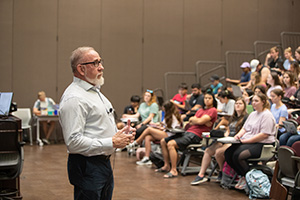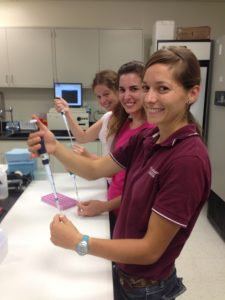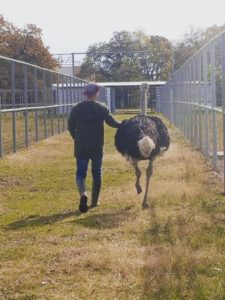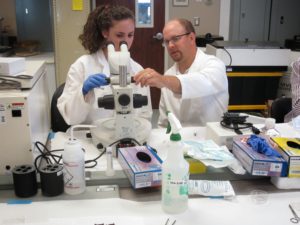- What to Expect
- How Do We Fit?
- Electives
- Certificates
- Undergraduate Research Opportunities
- Success
- Biomedical Sciences (BIMS) Undergraduate Program (College of Arts & Sciences)
- VTPP Undergraduate Courses
What to Expect
- Innovation
- Devoted Faculty

Faculty members in the Department of Veterinary Physiology & Pharmacology (VTPP) are dedicated to the effective education of all aspects of physiology, pharmacology, and toxicology. In our teaching labs, you will have the chance to collect physiologic data on yourself as you investigate human physiology in Biomedical Physiology 1. As a Bioengineering student, you will be tasked with the design and development of potentially life-saving technology.
Our classroom spaces in the Veterinary & Biomedical Science Education Complex (VBEC) are designed for maximal instructor interaction. Our award-winning instructors make the most of class time by providing relevance and applications of course materials. Our courses have an extensive library of support and supplementary materials through Texas A&M’s Learning Management System—Canvas.
How Do We Fit?
- Upper level
- Pre-professional
- Physiology in Engineering

Educationally, VTPP offers many upper-level courses that serve as the capstone to your undergraduate experience. Some of the last courses you take before matriculation to your professional program, courses in VTPP are integrative and cross-disciplinary, providing you with a detailed view of the “big picture” that will serve you well as the foundation in your future career. If you plan wisely, you can take Biomedical Physiology 1 (VTPP 423), Biomedical Physiology 2 (VTPP 427), as well as Fetal & Embryo Physiology (VTPP 452) or Pharmacology (VTPP 425) prior to starting your rigorous professional curriculum. Students who have done so are frequently grateful to themselves for taking advantage of these educational experiences and grateful to the instructors who equipped them for success in their program. VTPP also offers prerequisite courses in physiology for students majoring in biomedical engineering (VTPP 434 & VTPP 435). These courses provide systematic training in engineering analysis of living systems and application physiology principles to solve clinical and engineering problems.
Electives
- Focus
- Be intentional with elective selection
- Small classes
VTPP offers a myriad of elective courses to enhance your degree as well as augment your experience in professional programs. You can select electives that fit your career goals and enjoy the benefit of learning from our dedicated faculty in a more personal learning environment.

If you’re interested in pursuing a career in one of the fields of clinical medicine, consider taking Pharmacology (VTPP 425), Physiology 2 (VTPP 427), Introduction to Toxicology (VTPP 429), and Fetal & Embryo Physiology (VTPP 452). If you are headed into Biomedical Research, then sign-up for Analysis of Genomic Signals (VTPP 438), Non-coding RNAs (VTPP 439), and our Practicum in Biomedical Research (VTPP 444) as a part of our Undergraduate Research Certificate.
VTPP also offers opportunities for students to experience human and animal health on several different levels. You can learn about how medicine developed in one of our Study Abroad courses, History of Medicine in Europe (VTPP 401). Or you can work with several exotic species at our Winnie Carter Wildlife & Exotic Animal Center (VTPP 285/485).
VTPP offers several engaging electives to enrich your undergraduate experience. Our faculty are developing new courses and revising foundational courses all the time so students receive a topical, relevant, and applicable educational experience.
Certificates
- Undergraduate research
- Reproduction
Certificates offered by VTPP provide students with the opportunity to dig deeper into their chosen field. Our Certificate in Undergraduate Research is part of the largest Undergraduate Research Program at Texas A&M University. Currently focused on Cardiovascular Research, students can earn this certificate through courses (VTPP 123, 223, 224, 234, 235, & 444). You can work as part of a research team investigating specific questions in Cardiovascular & Vascular Physiology. Not only will you have the opportunity to investigate many research questions, but you may have the opportunity to present your results at a conference and possibly publish your first research journal article!
In addition to Undergraduate Research, VTPP is developing a Certificate in Reproduction. Utilizing our updated Reproductive Sciences Center, you’ll have the opportunity to study in-depth Reproductive Physiology, including transgenics, assisted reproductive techniques, etc.

Undergraduate Research Opportunities
- Aggie Research Scholars
- Tier One Program
- Individual Faculty
With most professional programs emphasizing research experience as a necessary component of a successful applicant’s packet, VTPP offers many opportunities for undergraduate students to participate in research and houses the largest undergraduate research program at Texas A&M University. From Aggie Research Scholars, our current Tier One Program, and our talented faculty’s individual labs, you have the chance to study cardiovascular disease, bone development, reproduction, and regenerative medicine.
Success
Students who invest their education in VTPP find they have an advantage over their peers in their post-undergraduate studies. Some comments:
It’s a great feeling to know that I have seen the majority of information before even walking into class.
JB, graduate student about VTPP 423
I was VERY relieved to be only reviewing acid-base today while the rest of the students had a puzzled stare on their face. Your class is the most helpful and useful class I ever took in undergrad and I’m sure acid-base will not be the only topic I have a leg up on.
SH, Allied Health student about VTPP 427
